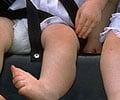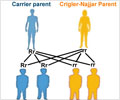Genetic mutation could cause club foot, US study suggests.
Genetic mutation could cause club foot, US study suggests.
Club foot, in which the foot turns inward and downward, making walking difficult, is one of the most common severe musculoskeletal birth defects, with a worldwide incidence of one in 1,000 live births, according to the researchers.The foot resembles the end of a golf club (hence its name). The most common form of clubfoot is known as 'equinovarus', clubfoot is also known as Talipes Equinovarus or Talipes.
About half of club foot cases affect both feet, including the bones, muscles, tendons and blood vessels.
If untreated, those affected walk on the outside of their feet, which can lead to long-term pain and disability. Treatments include the use of casts and splints, or surgery.
A family link plays a role in about 25 per cent of cases, the researchers say, but this is the first gene linked to the condition in humans.
"Club foot is a complex disorder, meaning that more than one gene as well as environmental factors will be discovered to play a role," said the study's senior author,
Advertisement
"Identifying the genes for club foot will allow for improved genetic counselling and may potentially lead to new and improved treatment and preventive strategies for this disorder."
Advertisement
The mutation occurs in a gene key to the early development of lower limbs called PITX1, Dobbs and his colleagues reported in Thursday's online issue of the American Journal of Human Genetics.
To find the mutation, the researchers analyzed the DNA of 35 extended-family members of an infant boy who is severely affected.
The boy has club foot in both feet, as well as duplicated toes, and he is missing the tibia in the right leg.
The PITX1 mutation was found in all 13 affected family members and three carriers who showed no clinical symptoms, the researchers said.
Until now, scientists did not know whether club foot was a muscle, nerve, spinal cord or brain problem.
The next step is to test if the mutation is important in many other children with club foot, said study co-author Dr. Christina Gurnett, a professor of neurology, pediatrics and orthopedic surgery at the university.
The research was funded by the U.S. National Institutes of Health, Children's Discovery Institute, March of Dimes, St. Louis Children's Hospital Foundation, Pediatric Orthopaedic Society of North America and Shriner's Hospital.
Source-Medindia
GPL/SK












